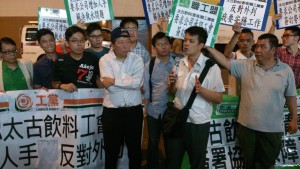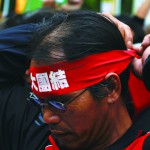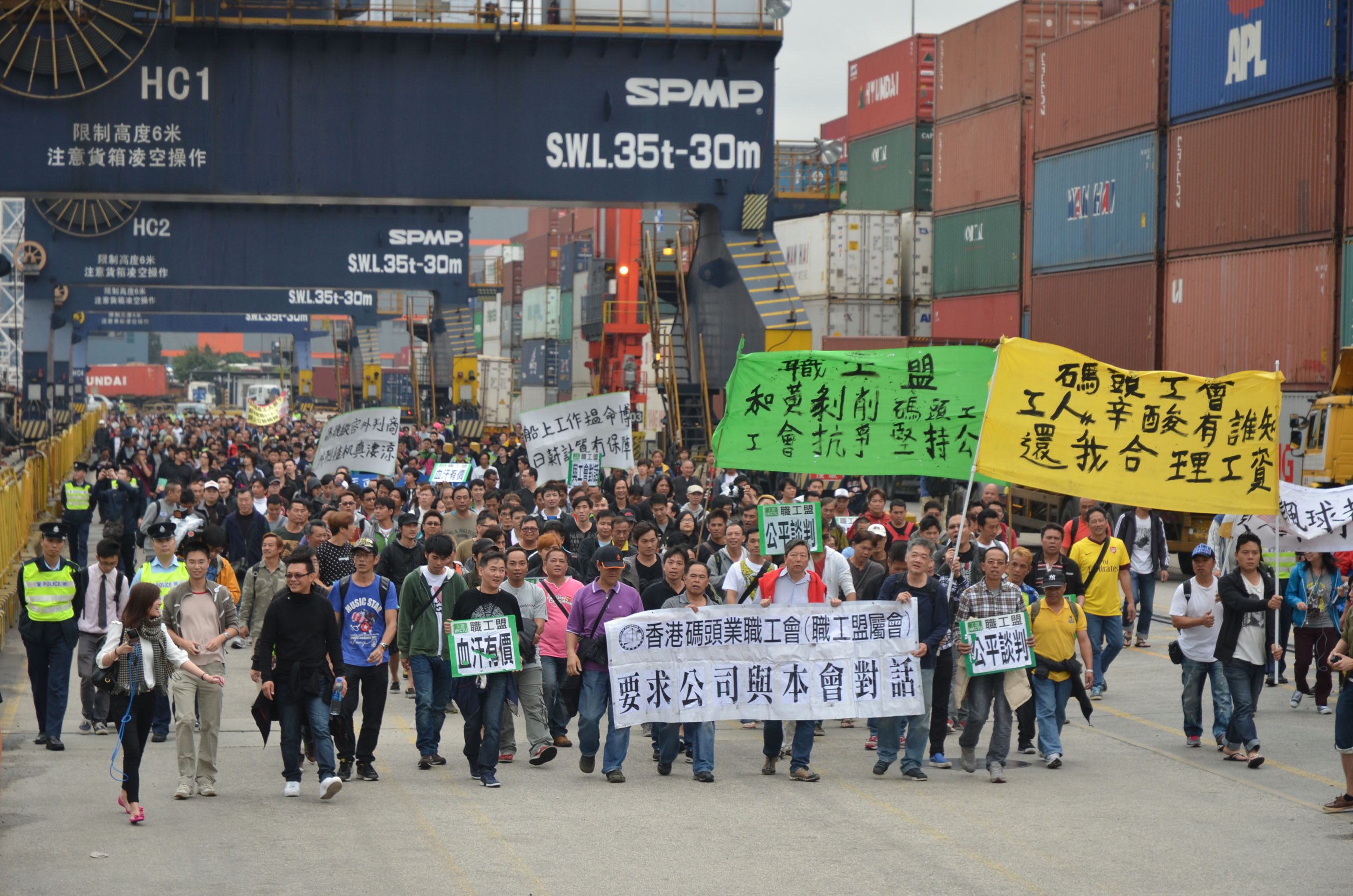Collective bargaining rights remain out of reach for Hong Kong workers
By Brian Yu & Kelly Wong
Stanley Ho Wai-hong will never forget the 40 days that began on March 28 2013. “At eight o’clock in the morning, over one hundred dockworkers blocked the entrance of Terminal Six and stopped the cargo vans from entering the terminal,” says the unionist. “This is how the strike started.”
As the General Secretary of the Union of Hong Kong Dockers, Ho led more than 500 dock workers in the longest strike in Hong Kong history for better pay and working conditions. Their employers were contractors working for Hong Kong International Terminals, a subsidiary of tycoon Li Ka-shing’s Hutchison Whampoa.
It was a David and Goliath scenario and the dockers’ cause earned them widespread public support. People donated tents, food and drinks and daily supplies to sustain the strike. Even when it rained down hard, many supporters put on their raincoats to join the striking workers.

In the end, the workers settled for a 9.8 per cent pay rise and promises of better working conditions, such as meal breaks and toilet breaks, allowing Ho to step back from the frontline. He is still doing union work and carrying out labour education.
Although the dockers managed to get a deal, Ho hopes Hong Kong can implement a collective bargaining law to protect workers’ rights.
Under Hong Kong’s Employment Ordinance, every employee has the right to strike and join a trade union. However, they do not have collective bargaining rights. This means there is no legal responsibility for employers to either enter negotiations with employees or to respond to their demands.
Ho says all three rights are of paramount importance in defending labour rights and the absence of a collective bargaining law leads to many unnecessary strikes and conflicts. He says that since employers are not obliged to participate in negotiations, employees can never bring their grievances and demands to the negotiating table. “Without the collective bargaining mechanism, we have no choice but to go on strike and let more people hear our voice,” says Ho.
That is not to say that Ho thinks a law on collective bargaining would necessarily eliminate or even reduce strikes and conflicts. However, it would at least provide an opportunity for employees and the employers to sit down to rationally discuss their concerns or even reach a consensus. “Why can’t we calmly negotiate in a civilized society?” says Ho.
Another reason to have collective bargaining is to ensure employers strictly follow any agreements made in the negotiation process. In the absence of legislation, employers are not legally bound to follow any verbal agreement reached with a trade union and there are no legal consequences to reneging on it.
Before they went on strike, dock workers’ representatives tried to negotiate with their employers, the contractors. One of the representatives was Ken Lai Ma-kin, who has worked in the terminal for more than 20 years and operates the lifting gear.
Lai recalls the company said they would follow up on workers’ demands after their meeting but no real progress was made. The labour representatives later also handed in a petition but the employers did not respond to it. With dialogue not working, the representatives called on more workers to join the strike.
Lai thinks collective bargaining legislation would put pressure on employers to respect negotiations with their employees. “If we do not put the consensus in black and white, they can deny all promises at any time,” he says.
The irony is that Hong Kong workers did briefly enjoy collective bargaining rights, thanks to a private member’s bill submitted by unionist and lawmaker Lee Cheuk-yan, which was passed in the last session of the pre-handover Legislative Council. Less than four months after the handover, the law was repealed by the Provisional Legislature. The reason given was that it would adversely affect Hong Kong’s competitiveness and attractiveness to overseas investment.
Changes to the rules after the handover mean that it would now be impossible for a lawmaker to table a private member’s bill on collective bargaining. While for its part, the government has no intention to reintroduce the law despite heated debate following the dock strike.
Instead, the Labour Department encourages voluntary negotiations between workers and their employers. It says the conciliation services it provides have been working well as evidenced by Hong Kong’s harmonious labour relations and low level of strike activity.
The chairman of the pro-business Liberal Party, Felix Chung Kwok-pan agrees. He describes the relationship between employees and employers in Hong Kong as close and friendly. Chung thinks most employers would rather hold on to their employees unless they deem their demands to be too high. “The businessmen sit down and talk to them, and they can solve the problem without the collective bargaining law. So why do we need the law?” he says.
Chung, who represents the textiles and garment functional constituency in LegCo, says more than 90 per cent of businesses in Hong Kong are small and medium enterprises (SME), which means they have fewer than 50 staff if they are in the service industry and 100 employees for those in industry. As the companies are small, Chung says it is easy for workers to enter direct dialogue with employers whenever disputes arise.
“If there is anything they are unhappy with, just go in and knock on the door and tell the boss directly,” Chung says.
Chung insists that when it comes to labour relations, one size does not fill all and that a collective bargaining law would get in the way of company operations. “You cannot apply one theory to everybody,” he says

However, labour sector legislator Tang Ka-piu says the unions are open to allowing for certain exclusions under any potential collective bargaining law. He explains that if a company is too small for effective implementation of the law, there can be some exemptions. The main thing, according to Tang, is that there needs to be general support for a collective bargaining law in society at large. “This may be difficult, but it is possible to achieve it step by step.”
Apart from ensuring that workers have collective bargaining rights to negotiate with individual employers, Tang also urges legislation to implement collective bargaining across specific industries. He says some industries with high rates of turnover, like the construction and tourism industries, practise wage-fixing which means the trade unions will negotiate wages with employers in the industry and they have to pay the fixed and agreed wages when hiring workers. This practice is becoming common among high mobility industries and is an important safeguard for workers.
However, Tang is worried that wage-fixing may violate the Competition Law which will be implemented this year, as the ordinance stipulates price-fixing as anti-competition behaviour. “If it is going to cause legal disputes, our organisation [will] strongly ask the government to legalise collective bargaining because if there is no law to ensure collective bargaining, other laws may override any agreements.” Tang says.
While the enactment of a collective bargaining law can ensure employers are duty bound to enter into the process of bargaining with employees, it cannot guarantee a mutually acceptable agreement. Whether workers can secure a satisfactory agreement depends on the strength and negotiating power of their unions.
Wong Hung, associate director of the Centre for Civil Society Studies at the Chinese University of Hong Kong, thinks this, rather than the lack of collective bargaining rights, is the biggest problem for Hong Kong’s trade unions. He says most trade unions in Hong Kong have weak organisational power. There is little genuine solidarity and many workers join the unions for the welfare benefits and shopping discounts they offer. The unions may have large memberships but most members show little or no concern about labour rights and union affairs – a phenomenon that has persisted for more than a decade.
Wong notes that another problem is that the unions’ focus on political discussions may be to the detriment of their work on protecting labour rights, which may no longer be the priority in union affairs. “They go to the political side, they become a party, and they will join the election,” he says.
The two major trade unions in Hong Kong are the pro-Beijing Hong Kong Federation of Trade Unions (HKFTU) and the pan-democratic Hong Kong Confederation of Trade Unions (HKCTU), of which the Union of Dock Workers is a member association. Apart from working on labour issues, the leaders of the unions are also legislators who actively participate into political discussions.
Given this scenario, Wong thinks it is more important and pragmatic to focus on discussing how to strengthen the power of trade unions rather than to fight for a collective bargaining law.
“If you just have a law, but if you can’t change the power base of a union, then the union can’t get real collective bargaining,” he says. “They write down the right but you never enjoy it.”
Even without a law on collective bargaining, it is possible for employers and employees to sign a collective bargaining agreement themselves. Wong notes the successful examples of the agreements reached between the unions and Cathay Pacific and Dragonair. Swire Beverages (HK) Employees General Union also reached an agreement with Swire Beverages last October. In all of these cases, the unions were strong.
Don Chan Hing-lung, president of the Swire employees union, says reaching an agreement with the company was not an easy process. It took a whole year for the company to sign the agreement after workers went on strike in 2013. “Why did we have to argue over the agreement for so long? It is because the company pays excessive attention to every word. If we had the [collective bargaining] law, the company would take the initiative to negotiate with us. And it wouldn’t take us so long and be so hard to get the agreement.”
Although the workers got an agreement, Chan believes there is a pressing need for a collective bargaining law. He says that throughout the negotiation process, the employer was in a dominant position and even now, the company can terminate the agreement by giving three months’ notice. “The company always says this agreement is not bound by any legal framework,” he says.
But the situation is even worse in other companies. Chan says some unions are greatly suppressed by the company. “They even don’t have a notice board. This is a basic labour right which allows the union to promote [the union affairs] to its members…But they still accept this unfair treatment. ” For Chan, collective bargaining would act as a catalyst to gain recognition for unions and encourage workers to be concerned about their rights.
Rather than cause tension in the relationship between organised labour and employers, Chan says a recognised collective bargaining mechanism would actually enhance the relationship between labour and capital.
“Before signing the agreement, the relationship between the trade union and company is like that of a boyfriend and girlfriend. Negotiations could be called off anytime. But after signing the agreement, we at least have some insurance, like receiving maintenance,” says Chan.
Edited by Tracy Cheung











































